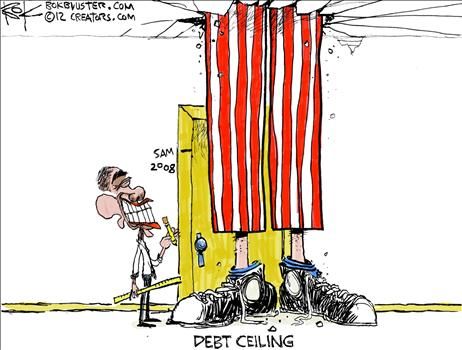
By
Robert J Samuelson
The
“fiscal cliff”
is a massive failure of presidential leadership. The tedious and technical
negotiations are but a subplot in a larger drama. Government can no
longer fulfill all the promises it has made to various constituencies. Some
promises will be reduced or disavowed. Which ones? Why? Only the president can
pose these questions in a way that starts a national conversation over the
choices to be made, but doing so requires the president to tell people things
they don’t want to hear. That’s his job: to help Americans face unavoidable, if
unpleasant, realities. Barack Obama has refused to play this role.
Instead,
he has cast the long-term budget problem as a question of whether the richest 1
percent or 2 percent of the population should pay more in taxes. Not only that,
but he has insisted that the higher taxes be paid by raising rates, as opposed
to reducing various tax breaks (deductions, exemptions, preferential rates)
enjoyed heavily by upscale Americans. The obsession with rates is bad policy
(higher rates may threaten risk-taking, work effort and hiring) but qualifies
as good politics: It signals Obama is macho; he’s tough on the rich, who are
implicitly blamed for the nation’s budget and economic woes.
Whatever
one thinks about raising taxes at the top (and I have no objection to it as
part of comprehensive budget package), it’s not the crux of the problem. The
crux of our problem — the problem being the bipartisan and untenable promises
made to most Americans of both high government benefits and low taxes — arises
from an aging population and high health costs, which cause rapid increases in
spending on Social Security, Medicare and Medicaid. Let me repeat some
statistics I’ve often cited. In 2012, Social Security, Medicare and
Medicaid accounted for 44 percent of
non-interest federal spending. As for taxes, the richest 5 percent
paid almost 40 percent of federal taxes in 2009 (and
within that, the richest 1 percent paid 22 percent of taxes).
The
nonpartisan Congressional Budget Office puts it this way:
“With the population
aging and health care costs per person likely to keep growing faster than the
economy [gross domestic product], the United States cannot sustain the federal
spending programs that are now in place with the federal taxes (as a share of
GDP) that it has been accustomed to paying.”
Until
Obama conspicuously and consistently acknowledges these realities in
straightforward and unmistakable language — something he hasn’t done and shows
no signs of doing — he cannot be said to be dealing honestly with the budget or
with the American people. The main reason that we keep having these destructive
and inconclusive budget confrontations is not simply that many Republicans have
been intransigent on taxes. The larger cause is that Obama refuses to concede
that Social Security, Medicare and Medicaid are driving future spending and
deficits. So when Republicans make concessions on taxes (as they have), they
get little in return. Naturally, this poisons the negotiating climate.
Of
course, Obama would offend many Democrats if he entertained benefit cuts in
Social Security and Medicare: higher eligibility ages, higher premiums for
affluent elderly, structural changes in the health-care system to reduce costs.
Just as many Republicans don’t want taxes raised a penny, many Democrats don’t
want benefits cut a penny. Consider the highly technical proposal to shift from
the standard consumer price index (CPI) to a “chained” CPI to adjust Social Security
benefits. From 2013 to 2022, this change is estimated to reduce Social Security
spending by $100 billion. Over that decade, total Social Security benefits are
estimated at $10.588
trillion; the cut would be less than 1 percent. Yet, many Democrats
reacted in horror, as if hordes of elderly would be impoverished.
Unfortunately,
much of the media have accepted the Obama narrative that it’s only Republican
rigidity that frustrates negotiations and leads to deadlock. This means, of
course, that there’s even less incentive for Obama and congressional Democrats
to engage in genuine bargaining.
The
result is that we’re not getting the debate we deserve and that budget choices
are being made mainly by default. Just as important, the periodic, ugly
confrontations over budget policy — the paralysis and bitterness they involve —
corrode confidence and weaken the economy. A weak economy creates few new jobs,
and the lack of jobs is the nation’s No. 1 social problem. Obama’s abdication
of responsibility may be in his political self-interest, but it is profoundly
hostile to the national interest.
No comments:
Post a Comment